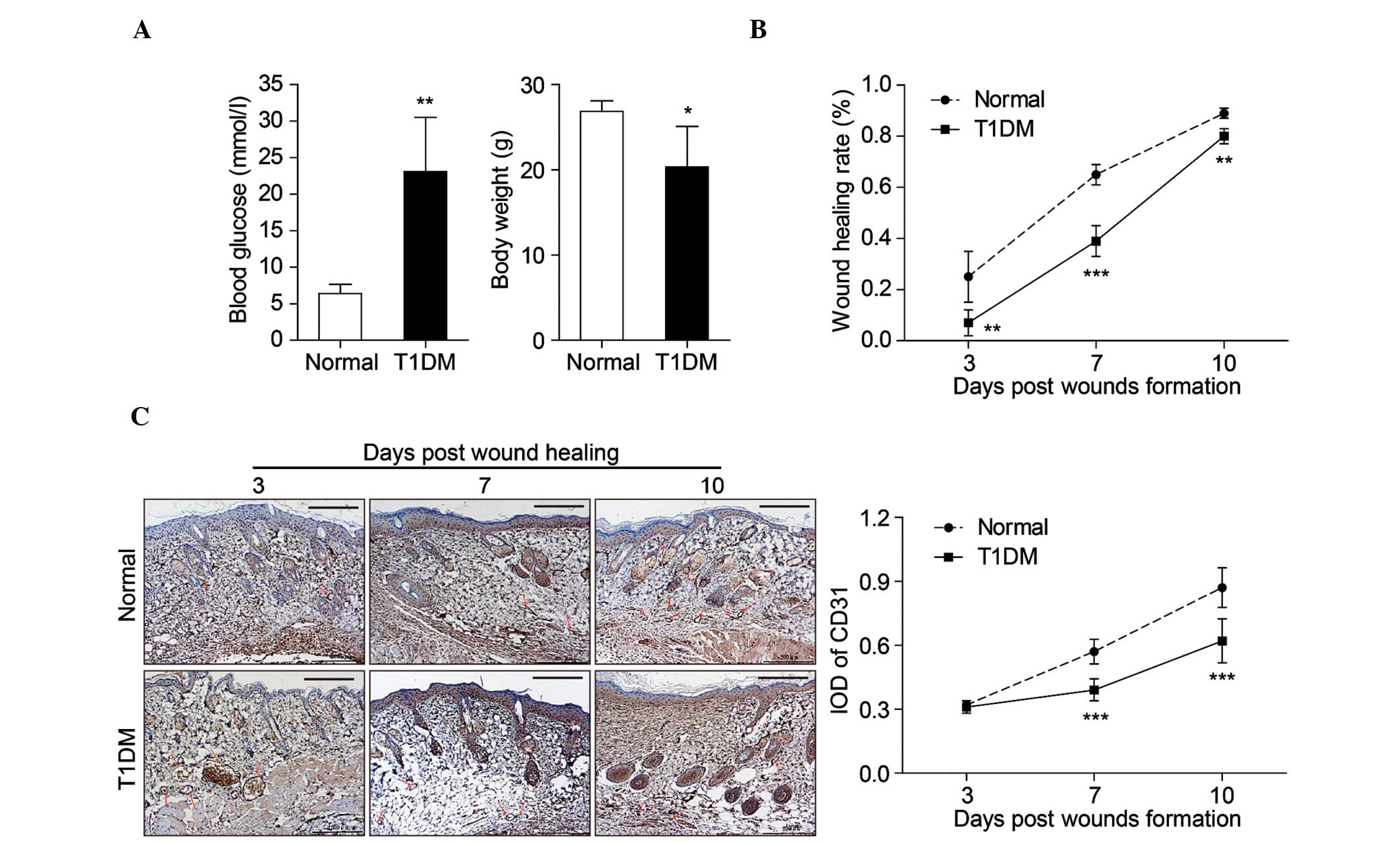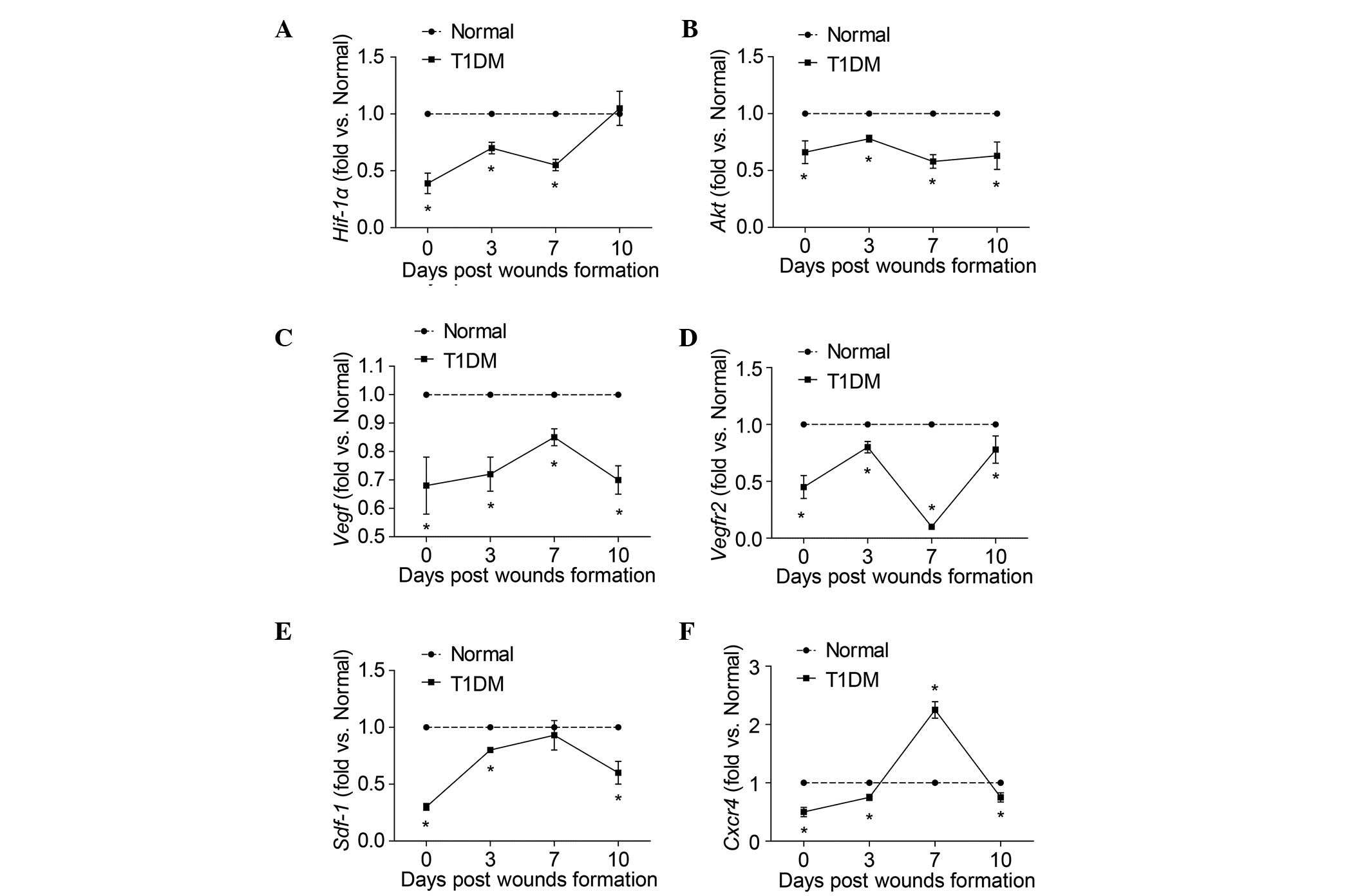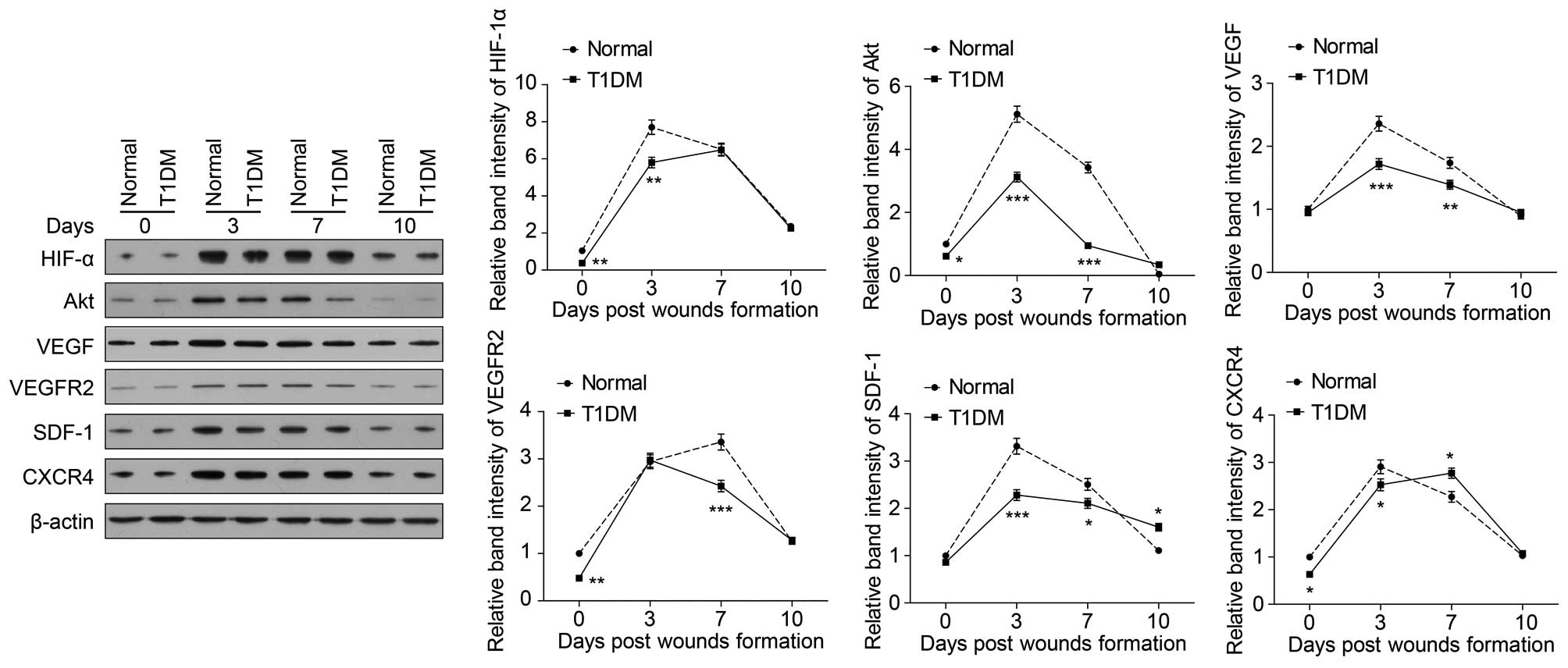|
1
|
Pedicino D, Liuzzo G, Trotta F, et al:
Adaptive immunity, inflammation, and cardiovascular complications
in type 1 and type 2 diabetes mellitus. J Diabetes Res.
2013:1842582013. View Article : Google Scholar : PubMed/NCBI
|
|
2
|
Siqueira MF, Li J, Chehab L, Desta T,
Chino T, Krothpali N, et al: Impaired wound healing in mouse models
of diabetes is mediated by TNF-alpha dysregulation and associated
with enhanced activation of forkhead box O1 (FOXO1). Diabetologia.
53:378–388. 2010. View Article : Google Scholar : PubMed/NCBI
|
|
3
|
Dasu MR, Thangappan RK, Bourgette A,
DiPietro LA, Isseroff R and Jialal I: TLR2 expression and
signaling-dependent inflammation impair wound healing in diabetic
mice. Lab Invest. 90:1628–1636. 2010. View Article : Google Scholar : PubMed/NCBI
|
|
4
|
Luo JD, Hu TP, Wang L, Chen MS, Liu SM and
Chen AF: Sonic hedgehog improves delayed wound healing via
enhancing cutaneous nitric oxide function in diabetes. Am J Physiol
Endocrinol Metab. 297:E525–E531. 2009. View Article : Google Scholar : PubMed/NCBI
|
|
5
|
Tie L, Li XJ, Wang X, Channon KM and Chen
AF: Endothelium-specific GTP cyclohydrolase I overexpression
accelerates refractory wound healing by suppressing oxidative
stress in diabetes. Am J Physiol Endocrinol Metab. 296:E1423–E1429.
2009. View Article : Google Scholar : PubMed/NCBI
|
|
6
|
Rai NK, Suryabhan, Ansari M, Kumar M,
Shukla VK and Tripathi K: Effect of glycaemic control on apoptosis
in diabetic wounds. J Wound Care. 14:277–281. 2005. View Article : Google Scholar : PubMed/NCBI
|
|
7
|
Darby IA, Bisucci T, Hewitson TD and
MacLellan DG: Apoptosis is increased in a model of
diabetes-impaired wound healing in genetically diabetic mice. Int J
Biochem Cell Biol. 29:191–200. 1997. View Article : Google Scholar : PubMed/NCBI
|
|
8
|
Fitsialos G, Bourget I, Augier S, Ginouvès
A, Rezzonico R, Odorisio T, et al: HIF1 transcription factor
regulates laminin-332 expression and keratinocyte migration. J Cell
Sci. 121:2992–3001. 2008. View Article : Google Scholar : PubMed/NCBI
|
|
9
|
Liu L, Marti GP, Wei X, Zhang X, Zhang H,
Liu YV, et al: Age-dependent impairment of HIF-1alpha expression in
diabetic mice: Correction with electroporation-facilitated gene
therapy increases wound healing, angiogenesis and circulating
angiogenic cells. J Cell Physiol. 217:319–327. 2008. View Article : Google Scholar : PubMed/NCBI
|
|
10
|
Janssen HL, Haustermans KM, Sprong D,
Blommestijn G, Hofland I, Hoebers FJ, et al: HIF-1A, pimonidazole
and iododeoxyuridine to estimate hypoxia and perfusion in human
head-and-neck tumors. Int J Radiat Oncol Biol Phys. 54:1537–1549.
2002. View Article : Google Scholar : PubMed/NCBI
|
|
11
|
Rey S, Lee K, Wang CJ, Gupta K, Chen S,
McMillan A, et al: Synergistic effect of HIF-1 alpha gene therapy
and HIF-1-activated bone marrow-derived angiogenic cells in a mouse
model of limb ischemia. Proc Natl Acad Sci USA. 106:20399–20404.
2009. View Article : Google Scholar : PubMed/NCBI
|
|
12
|
Andrikopoulou E, Zhang X, Sebastian R, et
al: Current insights into the role of HIF-1 in cutaneous wound
healing. Curr Mol Med. 11:218–235. 2011. View Article : Google Scholar : PubMed/NCBI
|
|
13
|
Like AA and Rossini AA:
Streptozotocin-induced pancreatic insulitis: New model of diabetes
mellitus. Science. 193:415–417. 1976. View Article : Google Scholar : PubMed/NCBI
|
|
14
|
Srinivasan K, Viswanad B, Asrat L, Kaul CL
and Ramarao P: Combination of high-fat diet-fed and low-dose
streptozotocin-treated rat: A model for type 2 diabetes and
pharmacological screening. Pharmacol Res. 52:313–320. 2005.
View Article : Google Scholar : PubMed/NCBI
|
|
15
|
Schlereth SL, Neuser B, Caramoy A,
Grajewski RS, Koch KR, Schrödl F, Cursiefen C and Heindl LM:
Enrichment of lymphatic vessel endothelial hyaluronan receptor 1
(LYVE1)-positive macrophages around blood vessels in the normal
human sclera. Invest Ophthalmol Vis Sci. 55:865–872. 2014.
View Article : Google Scholar : PubMed/NCBI
|
|
16
|
Allain TJ, van Oosterhout JJ, Douglas GP,
et al: Applying lessons learnt from the ‘DOTS’ tuberculosis model
to monitoring and evaluating persons with diabetes mellitus in
Blantyre, Malawi. Trop Med Int Health. 16:1077–1084. 2011.
View Article : Google Scholar : PubMed/NCBI
|
|
17
|
Richard JL, Sotto A and Lavigne JP: New
insights in diabetic foot infection. World J Diabetes. 2:24–32.
2011. View Article : Google Scholar : PubMed/NCBI
|
|
18
|
Li S and Li Q: A promising approach to
iPSC-based cell therapy for diabetic wound treatment: Direct
lineage reprogramming. Mol Cell Endocrinol. 393:8–15. 2014.
View Article : Google Scholar : PubMed/NCBI
|
|
19
|
Jiang BH, Jiang G, Zheng JZ, Lu Z, Hunter
T and Vogt PK: Phosphatidylinositol 3-kinase signaling controls
levels of hypoxia-inducible factor 1. Cell Growth Differ.
12:363–369. 2001.PubMed/NCBI
|
|
20
|
Zhong H, Chiles K, Feldser D, Laughner E,
Hanrahan C, Georgescu MM, Simons JW and Semenza GL: Modulation of
hypoxia-inducible factor 1 alpha expression by the epidermal growth
factor/phosphatidylinositol 3-kinase/PTEN/AKT/FRAP pathway in human
prostate cancer cells: Implications for tumor angiogenesis and
therapeutics. Cancer Res. 60:1541–1545. 2000.PubMed/NCBI
|
|
21
|
Loh SA, Chang EI, Galvez MG, Thangarajah
H, El-ftesi S, Vial IN, Lin DA and Gurtner GC: SDF-1 alpha
expression during wound healing in the aged is HIF dependent. Plast
Reconstr Surg. 123:(2 Suppl). 65S–75S. 2009. View Article : Google Scholar : PubMed/NCBI
|
|
22
|
Bermudez DM, Xu J, Herdrich BJ, Radu A,
Mitchell ME and Liechty KW: Inhibition of stromal cell-derived
factor-1α further impairs diabetic wound healing. J Vasc Surg.
53:774–784. 2011. View Article : Google Scholar : PubMed/NCBI
|
|
23
|
Thangarajah H, Yao D, Chang EI, Shi Y,
Jazayeri L, Vial IN, et al: The molecular basis for impaired
hypoxia-induced VEGF expression in diabetic tissues. Proc Natl Acad
Sci USA. 106:13505–13510. 2009. View Article : Google Scholar : PubMed/NCBI
|
|
24
|
Kijowski J, Baj-Krzyworzeka M, Majka M,
Reca R, Marquez LA, Christofidou-Solomidou M, Janowska-Wieczorek A
and Ratajczak MZ: The SDF-1-CXCR4 axis stimulates VEGF secretion
and activates integrins but does not affect proliferation and
survival in lymphohematopoietic cells. Stem Cells. 19:453–466.
2001. View Article : Google Scholar : PubMed/NCBI
|
|
25
|
Thangarajah H, Vial IN, Grogan RH, Yao D,
Shi Y, Januszyk M, et al: HIF-1 alpha dysfunction in diabetes. Cell
Cycle. 9:75–79. 2010. View Article : Google Scholar : PubMed/NCBI
|
|
26
|
Ceradini DJ, Kulkarni AR, Callaghan MJ,
Tepper OM, Bastidas N, Kleinman ME, et al: Progenitor cell
trafficking is regulated by hypoxic gradients through HIF-1
induction of SDF-1. Nat Med. 10:858–864. 2004. View Article : Google Scholar : PubMed/NCBI
|
|
27
|
Rajagopalan S, Olin J, Deitcher S, Pieczek
A, Laird J, Grossman PM, et al: Use of a constitutively active
hypoxia-inducible factor-1 alpha transgene as a therapeutic
strategy in no-option critical limb ischemia patients: Phase I
dose-escalation experience. Circulation. 115:1234–1243.
2007.PubMed/NCBI
|

















